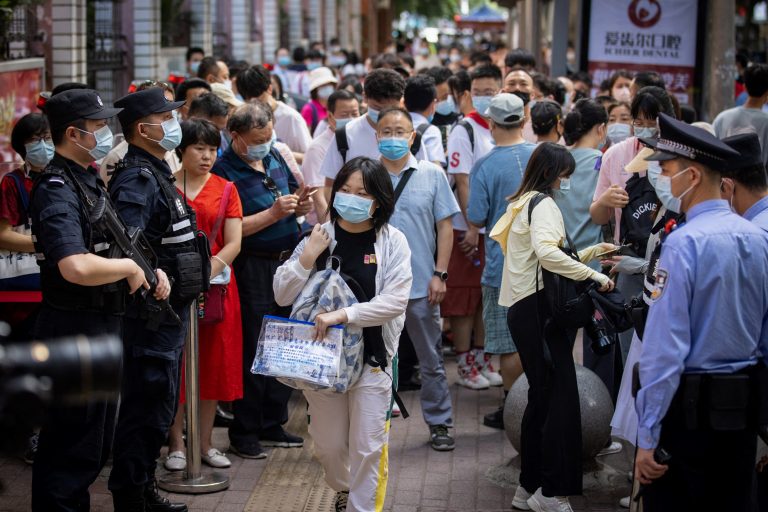The Chinese communist regime is pressing ahead with its crackdown on private tutoring services in the country as part of an effort to encourage couples to have more children. At a recent meeting, the Politburo of the Chinese Communist Party Central Committee instructed local governments across the nation to implement a three-child family policy as well as “improve supporting policies relating to childbirth, parenting, and education.”
By banning after-school private tutoring, Beijing hopes that the expenditure involved in raising children will be brought down, thus potentially encouraging families to have more kids. For the past several decades, China had strictly enforced a one-child policy aimed at controlling the population. The policy backfired as the population growth declined significantly, leading to problems like a skewed male-to-female ratio and a steady rise in the number of older citizens.
Beijing then introduced a two-child policy in an attempt to get population growth back to normal. However, this hasn’t worked out as expected. The new three-child policy and the focus on cutting down child-raising costs are attempts to deal with the country’s population issues.
A directive that outlines measures to be taken as part of the recent crackdown on private tutoring asks local authorities to establish supervisory bodies to monitor the activities of tutoring schools. It asks for a ban on advertisements for tutoring.
“No new subject-based off-campus training institutions are being approved for students in compulsory education, while existing subject-based training institutions will be registered as non-profit institutions… Subject-based tutoring institutions are not allowed to be listed for financing, and capitalization operations are strictly prohibited… Training institutions must not organize subject-based tutoring on national statutory holidays, rest days, or winter and summer vacations,” the directive said.
Success
You are now signed up for our newsletter
Success
Check your email to complete sign up
New guidelines also suggest that after-school services in schools are to be strengthened. However, it isn’t clear as to whether public schools are to offer out-of-hours tuition to students, which might result in the schools transferring a part of these additional costs to parents. According to current affairs commentator Fang Yuan, the government’s decision could increase the economic burden on families and the quality of education itself could suffer due to “lack of competition.”
Chinese parents are estimated to spend up to $43,500 annually on their children’s extracurricular classes, which is roughly three times the country’s median income. In cities like Shanghai and Beijing, around 70 percent of students in primary schools receive some sort of private tutoring.
Education companies
The crackdown on private tutoring is having a drastic impact on companies operating in the sector. Shares of education and technology firms have been hit. A July 23 document obtained by Reuters showed that Beijing plans to force existing tutoring institutes to register as nonprofits. Local governments have been ordered not to approve new institutes.
Tutoring institutions have now been barred from raising capital from the stock market. They cannot accept investments from foreign individuals or entities, whether it be via acquisitions, mergers, or setting up franchises. Primary and middle school teachers in the county are banned from tutoring for money on core subjects.
Stock prices of Chinese education companies listed in American exchanges have fallen after the CCP’s directives. JPMorgan warned that Beijing’s new rules have made “these stocks virtually un-investable.” Industrial Securities has asked investors to avoid betting on education-related stocks. On July 16, the chairman of the China Securities Regulatory Commission said that the development of the country’s capital markets had always had a “red bloodline.”
“This statement means the future of China’s capital market players can only be the CCP, the red capital… Wall Street investment banks have been well aware and adjusted their strategies for China Concepts Stocks… Due to the uncertainty of the CCP’s policies, Wall Street has chosen to withdraw its capital to avoid the risks,” senior investment adviser Mike Sun said to The Epoch Times.
Foreign education programs
A document released on July 24 also prohibits training institutions from providing educational programs that have been developed overseas. Most of these institutions usually use self-published materials. Only some of those who teach the English language use foreign materials.
In an interview with The Epoch Times, China expert Xue Chi said that the fundamental reason why Beijing is so against foreign teaching materials is due to the CCP’s rejection of Western values, specifically that of the United States and its constitution.
“The Chinese Communist Party (CCP) is particularly wary of the off-campus training industry, where students have a desire for knowledge and a sense of justice… The CCP reforming after-school training institutions is about bolstering its ideological fortress,” Xue said.
By overhauling the training institutions, the communist regime wants “full” and “complete” control over students’ minds. The CCP sees ideology and education as “strategic fronts,” and the party is getting “more extreme,” with brainwashing beginning from childhood, according to Xue.














